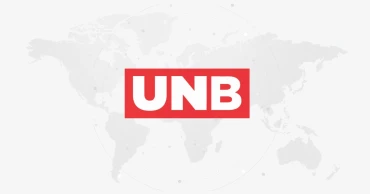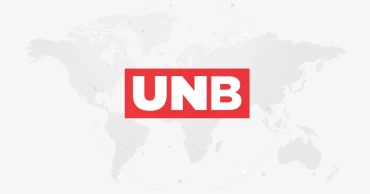International Organization for Migration (IOM)
Bangladesh can’t & shouldn’t bear Rohingyas’ responsibility alone: IOM
Although Bangladesh has generously hosted Rohingya refugees for the last five years, one country cannot and should not bear this responsibility alone, said the International Organization for Migration (IOM) on Thursday.
The IOM has called on the international community to take urgent action to ensure long-term development and sustainable humanitarian assistance for Rohingya refugees and host communities
Nearly 1 million refugees remain in congested camps. More than half of them are children.
August 25 marks five years since the first of hundreds of thousands of Rohingya men, women, boys, and girls fled violence and persecution in Myanmar and sought refuge in what is now the world’s largest refugee settlement in Cox’s Bazar, Bangladesh.
International and local humanitarian actors must continue to support the response led by the government of Bangladesh to enable the Rohingya to live a dignified life while in displacement, IOM said.
The Rohingya themselves have played a central role in the humanitarian response. From volunteering to support fire and cyclone response to door-to-door outreach to raise awareness of COVID-19 prevention measures, the community has led efforts across the camps to support each other.
As the crisis has become protracted, they should be further empowered through expanded access to education, skills development and livelihoods, IOM said.
Read: Rohingya Crisis: UN envoy seeks renewed int'l attention, equitable burden-sharing by other countries
With limited access to earn a living, Rohingya refugees in Bangladesh remain fully reliant on humanitarian assistance.
Groups or persons with specific needs, such as persons with disabilities, female-headed households, or people without access to livelihood opportunities, reported the most significant unmet needs, leaving them vulnerable to negative coping strategies, such as human smuggling and trafficking.
Criminal trafficking networks employ different tactics to lure refugees to work outside the camp and abroad using false pretenses, coercion and abduction. As the lead agency on counter-trafficking in Cox’s Bazar, IOM has identified and assisted more than 1,300 victims of trafficking.
With the current monsoon season already causing historic flooding in northeastern Bangladesh, heavy rainfall where the camps are located could pose further hazards to the Rohingya in their temporary homes made from tarpaulin sheets and bamboo.
In 2021, heavy monsoon rains in the camps caused immense flooding incidents that affected nearly 30,000 people; 19,000 were once again displaced and lost their homes.
The government of Bangladesh along with IOM and humanitarian partners delivers life-saving aid and basic services.
IOM continues to provide shelter, protection, mental health and psychosocial services, and water and hygiene support.
IOM also implements disaster risk reduction initiatives to mitigate the impacts of climate change in Bangladesh.
3 years ago
7.1mn people displaced by war in Ukraine: IOM
Over 7.1 million people have been internally displaced since the invasion of Ukraine, according to the second Ukraine Internal Displacement Report issued by the International Organization for Migration (IOM).
This represents a 10 per cent increase in number of internally displaced persons (IDPs) in Ukraine since the first round of the survey on 16 March.
Also read: Ukraine says Russia preparing offensive in southeast
IOM conducted its second survey between 24 March and 1 April to gather insights into internal displacement and mobility, and assess needs in Ukraine to inform the overall humanitarian response.
“People continue to flee their homes because of war, and the humanitarian needs on the ground continue to soar,” said IOM Director General António Vitorino.
“Humanitarian corridors are urgently needed to allow the safe evacuation of civilians and ensure the safe transportation and delivery of much-needed humanitarian aid in order to rapidly assist those internally displaced.”
According to the survey, more than 50 per cent of displaced households have children, 57 per cent include elderly members, and 30 per cent have people with chronic illnesses.
Within the first month of the war, the income of displaced households dropped sharply.
While only 13 per cent of now displaced households reported a monthly income under 5,000 Ukrainian hryvnias (USD 170) prior to 24 February 2022, currently 61 per cent of them indicate that their household income has been lower than 5,000 hryvnias since the start of the war.
Over one third of displaced households indicate that they have had no income in the last month.
Cash and financial support, transportation, food, shelter, and hygiene items are among the most pressing needs for displaced people.
Access to medicines and health services remains the second most pressing need for both those displaced, and those staying at their places of residence.
Also read:Bangladeshi students caught up in Ukraine conflict offered opportunity to study in Russia
IOM teams on the ground continue to provide essential humanitarian assistance to internally displaced persons and host communities, but more communities in need remain trapped.
Tangible support provided so far has included food, non-food and hygiene items, cash, mental health and psychosocial support, as well as information campaigns to help prevent human trafficking and sexual exploitation and abuse.
The cessation of hostilities in Ukraine is of utmost importance, to allow for humanitarian access to all affected populations.
3 years ago
Rohingya camp fire: IOM deploys teams to support affected people
IOM in coordination with the humanitarian actors in Cox’s Bazar will soon conduct technical assessments to better assess the damages caused by a recent fire, and the immediate and longer-term needs of the affected people.
The International Organization for Migration (IOM) has taken a mobile medical team on the ground to provide assistance as needed.
Additionally, IOM through its communications with communities (CwC) team is being deployed within the camp to ensure people have access to right information.
Read: 1200 homes gutted in Ukhia Rohingya camp fire
IOM has taken immediate steps to mobilize non-food item (NFI) kits for all affected households- which are being supplemented with blankets to help those affected to keep warm amidst the cold dry weather in Cox’s Bazar.
“We are coordinating with other humanitarian actors to ensure that those affected are provided with food, health, protection, water, sanitation, and hygiene needs. Shelter repair/rebuilding and access to cooking facilities – in the form of LPG are top priorities as the affected families seek to recover from the damages caused by the fire,” said Nusrath Ghazzali, officer-in-charge for IOM Bangladesh.
A significant fire swept through camp 16 under IOM’s area of responsibility in Cox’s Bazar on Sunday afternoon, impacting thousands of Rohingya refugees and host community members, and causing considerable damage to sections of the world’s largest refugee camp.
The fire was first reported just before 5pm and IOM immediately mobilized response teams to protect refugees and bring the situation back under control in coordination with the local authorities and fire brigade.
The cause and origin of the fire is unknown at this stage.
At this stage no fatalities have been reported, though two people are reportedly injured by the fire.
Read: Cox's Bazar Rohingya camp fire: Teams working 24/7 to regain normalcy
This latest fire comes a week after another fire broke out in the refugee camp on 2 January causing significant damage to IOM’s Severe Acute Respiratory Infection and Isolation and Treatment Center (SARI ITC) in camp 20 Extension.
The conditions in the camps make large fires a real risk.
In March 2021, a massive fire that broke out in the camp resulted in loss of life, displaced 45,000 Rohingya refugees and caused catastrophic damage to the world’s largest refugee camp.
4 years ago
Tireless advocate of migrant refugees Swing passes away
William Lacy Swing, former Director General of the International Organization for Migration (IOM) and longtime US diplomat, has died in Kuala Lumpur, Malaysia. He was 86.
A tireless advocate on behalf of migrants and refugees, DG Swing was interviewed by BBC in Cox's Bazar, Bangladesh, in Oct 2017, as hundreds of thousands of Rohingya were fleeing across the border from Myanmar.
"It is with a heavy heart that I learned of my predecessor's passing today," IOM Director General António Vitorino said on Saturday.
Read: Preparedness strengthened ahead of cyclone, monsoon season in Cox's Bazar: IOM
"His was a life of service to his country and humanity, and a source of inspiration to us all."
Swing was born in Lexington, North Carolina in the United States in 1934. He entered the Foreign Service after graduating from Yale University (1956) and completing postgraduate studies in Germany (1960).
Over four decades, his diplomatic career included six US Ambassadorial postings, in the Republic of the Congo, Liberia, South Africa, Nigeria, Haiti and the Democratic Republic of the Congo before retiring from the US Foreign Service in 2001 and embarking on a second career with the United Nations.
Swing often told the story of arriving in Port Elizabeth, South Africa, as a junior foreign service officer in 1963 as Nelson Mandela was being transferred to Robben Prison.
He returned 26 years later as Ambassador to witness Mandela's release and subsequent presidency over post-Apartheid South Africa and cited that transformation as an example of the seismic changes that can occur over the course of a single lifetime.
Prior to joining IOM Swing served as United Nations Special Representative of the United Nations Secretary-General in Western Sahara (2001-2003) and the DRC (2003-2008).
Read:160 Bangladeshi migrants return from Libya with IOM support
He was elected Director General of IOM in 2008, steering the Organization for the next decade through its greatest period of expansion since the organization’s foundation in 1951.
Under Swing’s stewardship, IOM grew into an agency with an annual operating budget of an estimated USD1.5 billion and more than 10,000 staff working in over 150 countries worldwide. IOM currently has 174 Member States.
Swing felt strongly that IOM's future lay in formalizing the well-established working relationship between the Organization and the United Nations system.
In September 2016, then-DG Swing and Secretary-General Ban-Ki Moon signed the agreement that established IOM – UN Migration – as a related organization of the UN.
As UN Migration, IOM became the point of reference in the global debate on the social, economic and political implications of migration in the 21st century.
Shortly before to his retirement in 2018, Swing heralded the completion of the Global Compact for Safe, Orderly and Regular Migration as an important milestone to improve international cooperation on migration.
Read: $ 20mn required to respond to urgent needs after Rohingya camps fire: IOM
“This is not the end of the undertaking but the beginning of a new historic effort to shape the global agenda on migration for decades to come,” he said at the time.
IOM staff around the world are deeply saddened by the news of Mr. Swing’s passing and extend their deepest condolences to his family.
He has a son, Brian, and a daughter, Gabrielle, and has lived in Kuala Lumpur, Malaysia with his wife Yuen Cheong since his retirement.
4 years ago
IOM to produce hand sanitizer with district admin, local partners in Cox’s Bazar
After assessing market conditions to gauge the viability of locally produced hygiene items, the International Organization for Migration (IOM) has collaborated with the Cox’s Bazar district administration to explore the possibility of producing hand sanitizer locally in accordance with World Health Organization guidelines for local production.
5 years ago
IOM assists vulnerable migrants impacted by COVID-19 pandemic
International Organization for Migration (IOM), the United Nation’s Migration Agency, provides immediate and mid- to long-term assistance to vulnerable migrants returning from the European Union (EU) countries.
IOM is supporting the Government to plan for the return, reception, and reintegration of a few hundred thousand migrants in 2020 from destination countries globally, including a number from the EU, said a press release issued on Thursday.
According to the Bureau of Manpower, Employment and Training (BMET), each year, around 600,000 workers migrate from Bangladesh in search of better livelihood opportunities abroad. In 2019, around USD 18 billion was remitted to Bangladesh by migrants.
IOM and partners are concerned that the predicted 22 per cent drop in remittances to South Asia, driven by the global economic slowdown, will have adverse consequences for migrants and remittance dependent communities in Bangladesh.
IOM, in partnership with Bangladesh Rural Advancement Committee (BRAC), is focused on providing assistance to vulnerable migrants returning from EU countries and looking to secure additional funding to assist vulnerable migrants, particularly those returning from Gulf Cooperation Council(GCC) countries where there have been large-scale, sector-wide retrenchments following the decline in oil prices.
With EU support and under the coordination of the Ministry of Expatriates’ Welfare and Overseas Employment, IOM is assisting migrants stranded abroad and vulnerable migrants that have returned to Bangladesh from the EU.
Support and counselling are provided to callers to hotline (+8809610102030) set-up by IOM for migrants, promoted and accessed through www.probashihelpline.com. Since March 2020, a total of 111,470 migrants reached out via the website, either through social media interactions or through app-based calls.
Dr. Ahmed Munirus Saleheen, Secretary of Ministry of Expatriates' Welfare and Overseas Employment, said , “Migrants are the frontline soldiers of our national development. It is our priority to ensure the safety and security of migrant workers affected by the pandemic. The Ministry is involved in many initiatives to support migrants.”
Since March 2020, 806 vulnerable migrants, returning from EU countries, have been traced through ten EU funded reintegration service centres that cover 64 districts. Vulnerable migrants are identified, provided with COVID-19-related information, and counselled on how to cope with the adverse impacts of the pandemic, including mobility restrictions, unemployment, and growing debt.
After a needs and vulnerability assessment to identify the most vulnerable, eligible returnees will be provided with an immediate cash grant, long term reintegration support, skills training, and psychosocial counseling support. The provision of tailored assistance will build the resilience of vulnerable migrants to shock events like global health crises, the release added.
According to Rensje Teerink, Ambassador of the Delegation of the European Union to Bangladesh, “The Coronavirus pandemic is challenging economic and social systems globally. The European Union stands ready to help governments to address the negative impact of the pandemic - on the short, medium and long term - in particular with the most vulnerable communities which include migrants. Through the EU-funded Prottasha project, we ensure in this new post-Coronavirus reality, that migrants returning to Bangladesh from European Union Member States have all the tools at their disposal to be able to reintegrate themselves into society. Solidarity is at the heart of the European Union.
With a focus on the most vulnerable, the European Union supports its partner countries in delivering essential services and safeguarding livelihoods.”
“Hundreds of thousands of migrants are expected to return to Bangladesh once countries relax restrictions and airlines resume flights. For many of these migrants, it isn’t a happy homecoming as they have lost their source of income and due to the global recession it is unlikely that they will be able to return to work abroad until the global labour market recovers from the impacts of the COVID-19 pandemic. Our concern is that the most vulnerable of these migrants will require immediate assistance to meet their needs for food, shelter, psychosocial, and health assistance and in the medium to long-term they will require debt mediation assistance, and diversification of livelihoods assistance to build their resilience and ensure sustainable reintegration,” said Giorgi Gigauri, IOM Chief of Mission in Bangladesh.
Efforts to reach migrants within the country are ongoing, BRAC has engaged 100 staff and over 1000 community volunteers in COVID-19 awareness-raising activities.
Asif Saleh, Executive Director of BRAC, said, “Migrants need the right COVID-19 related information at the right time so that they protect themselves and rebuild. In this crisis, migrant workers are suffering tremendously, and we need to prioritize our support for them both at home and abroad.”
In addition to providing support to vulnerable migrants, IOM is supporting the government to respond to the COVID-19 outbreak, build capacity at points of entry, and provide humanitarian support to Rohingya refugees and vulnerable members of the host community in 18 camps and settlements in Cox’s Bazar district.
5 years ago
IOM says over 50,000 migrants left Libya for home countries
The International Organization for Migration (IOM) on Tuesday said over 50,000 migrants have voluntarily returned to their countries of origin from Libya since 2015.
5 years ago
Rohingya woman killed in Cox’s Bazar camp
A Rohingya woman was killed following an altercation with two other women over a trifling matter at Camp No-24 in Teknaf upazila on Tuesday morning.
6 years ago
.jpg)



.jpg)

.jpg)



